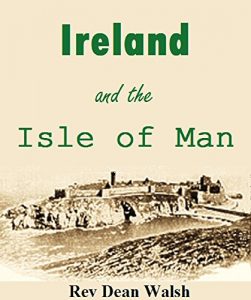From inside the book:
IN the period which preceded the more complete development o£ monasticism in Ireland, and the subsequent rise of her Celtic schools, island solitudes would seem to have had a remarkable fascination for our saints. Many of the islands which lie off the Irish coasts, or dot the intervening seas that separate us from the sister kingdoms of England and Scotland, are still invested with their traditional memories. Some of these holy men were content with the seclusion of the retreats they found amid the peaceful waters of their Irish lakes, while others sought more complete isolation in those rock-bound islets where the ocean formed a ready and potent barrier between them and the world they laboured to forget. Of these so-called " holy islands," that of Man, in the mid-channel between the two countries, possesses a unique distinction in the history of the ages of faith. To-day its name is mainly suggestive of the attractions which induce thousands of pleasure-seekers to make it their trysting ground for a summer holiday. But its early history presents much to fascinate the student of ecclesiastical lore, and should prove a source of interest incomparably more attractive than any o£ the inducements which now-a-days lead so many to visit its shores. Outside Ireland itself, nowhere do we find a spot so thoroughly stamped with old-time sanctity, or more intimately connected with the apostleship of the Irish saints. The seventeen divisions or parishes into which the little principality is divided still bear the impress of holiest memories. In the nomenclature of one and all we find a sacred dedication which has survived all the fitful changes and vicissitudes of fourteen long centuries. These landmarks, as we may style them, of the Christian invasion — the triumphs of the Cross, which so completely possessed this tiny kingdom, have never been effaced.
This pre-1923 publication has been converted from its original format for the Kindle and may contain an occasional defect from the original publication or from the conversion.
IN the period which preceded the more complete development o£ monasticism in Ireland, and the subsequent rise of her Celtic schools, island solitudes would seem to have had a remarkable fascination for our saints. Many of the islands which lie off the Irish coasts, or dot the intervening seas that separate us from the sister kingdoms of England and Scotland, are still invested with their traditional memories. Some of these holy men were content with the seclusion of the retreats they found amid the peaceful waters of their Irish lakes, while others sought more complete isolation in those rock-bound islets where the ocean formed a ready and potent barrier between them and the world they laboured to forget. Of these so-called " holy islands," that of Man, in the mid-channel between the two countries, possesses a unique distinction in the history of the ages of faith. To-day its name is mainly suggestive of the attractions which induce thousands of pleasure-seekers to make it their trysting ground for a summer holiday. But its early history presents much to fascinate the student of ecclesiastical lore, and should prove a source of interest incomparably more attractive than any o£ the inducements which now-a-days lead so many to visit its shores. Outside Ireland itself, nowhere do we find a spot so thoroughly stamped with old-time sanctity, or more intimately connected with the apostleship of the Irish saints. The seventeen divisions or parishes into which the little principality is divided still bear the impress of holiest memories. In the nomenclature of one and all we find a sacred dedication which has survived all the fitful changes and vicissitudes of fourteen long centuries. These landmarks, as we may style them, of the Christian invasion — the triumphs of the Cross, which so completely possessed this tiny kingdom, have never been effaced.
This pre-1923 publication has been converted from its original format for the Kindle and may contain an occasional defect from the original publication or from the conversion.












